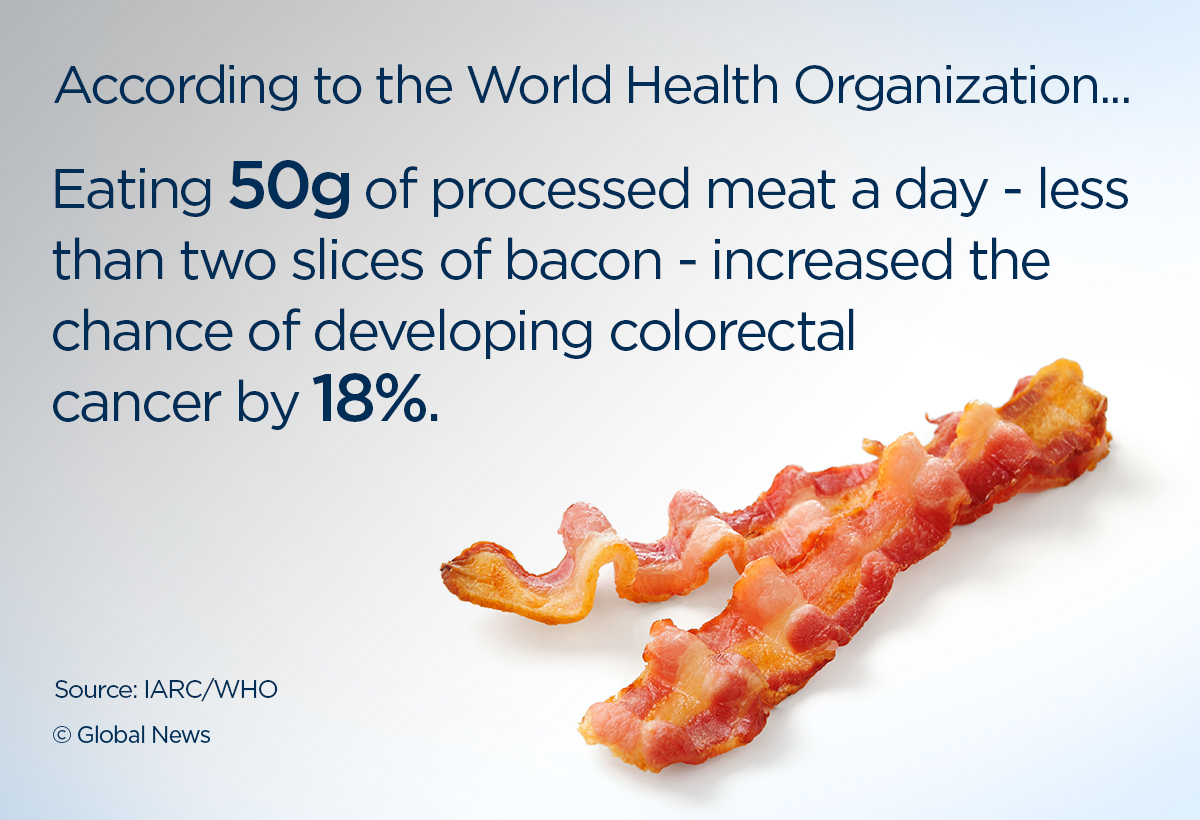Eating processed meat on a daily basis can increase the risk of colon cancer, while red meat is “probably” carcinogenic too, the World Health Organization (WHO) announced Monday.

Eating meats such as hot dogs, sausages, corned beef, ham, and beef jerky increases the risk of colorectal cancer, said the International Agency for Research on Cancer (IARC), a part of the WHO.
WATCH ABOVE: The Canadian Meat Council says people should continue to eat meat as part of a balanced diet. The World Health Organization released a report on Monday that stated people are at an increased risk for colon cancer by eating processed and red meat.
The agency classified processed meat as Group 1 – “carcinogenic to humans.” The same classification as cigarettes and asbestos.
According to IARC findings, experts said that a 50 gram portion of processed meat consumed on a daily basis increases the risk of bowel cancer by 18 per cent.
READ MORE: Why Canadians are already cutting back on red meat
- ‘She gets to be 10’: Ontario child’s heart donated to girl the same age
- Bird flu risk to humans an ‘enormous concern,’ WHO says. Here’s what to know
- Shoppers faces proposed class action over claims company is ‘abusive’ to pharmacists
- ‘Bacterial vampirism’: Deadly pathogens attracted to human blood, study finds
“For an individual, the risk of developing colorectal cancer because of their consumption of processed meat remains small, but this risk increases with the amount of meat consumed,” Dr. Kurt Straif, Head of the IARC monographs program, said in a statement. “In view of the large number of people who consume processed meat, the global impact on cancer incidence is of public health importance.”
The IARC went on to say that red meats are “probably carcinogenic,” but admitted there was limited evidence.
The IARC compiled the findings from more than 800 studies that investigated the link between more than 12 types of cancer and the consumption of red meats and processed meat.
“These findings further support current public health recommendations to limit intake of meat,” Dr. Christopher Wild, Director of IARC, said in a statement.
READ MORE: Is there a potential cancer risk of eating red and processed meat?
However, Wild noted that “red meat has nutritional value.”
WATCH: Say it ain’t so: Bacon, hot dogs linked to cancer. Global News breaks down the meaty details on WHO’s announcement
“These results are important in enabling governments and international regulatory agencies to conduct risk assessments, in order to balance the risks and benefits of eating red meat and processed meat and to provide the best possible dietary recommendations,” Wild said.
The North American Meat Institute (NAMI) issued a statement following the release of WHO’s study saying the classification of red and processed meat as cancer-causing “defies both common sense and numerous studies showing no correlation between meat and cancer and many more studies showing the many health benefits of balanced diets that include meat.”
NAMI went on to say IARC was “aiming for a specific result despite old, weak, inconsistent, self-reported intake data.”
WATCH: WHO doctor explains reasoning behind red meat, processed meat ruling
“They tortured the data to ensure a specific outcome,” Betsy Booren, NAMI Vice President of Scientific Affairs, said in a statement.
NAMI said that “cancer is a complex disease not caused by single foods and that a balanced diet and healthy lifestyle choices are essential to good health.”
Canada’s Food Guide recommends that adults should have two to three servings of meat and alternatives a day, while the Canadian Cancer Society recommends adults should try to limit red meat intake to three servings per week.




Comments